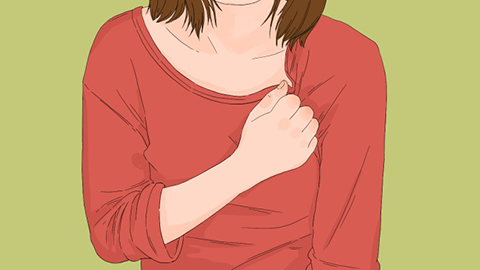What causes the feeling of chest tightness and discomfort when waking up in the middle of the night, and what should be done about it?
Waking up in the middle of the night with a feeling of chest tightness or discomfort may be caused by improper sleeping posture, anxiety, gastroesophageal reflux disease (GERD), arrhythmia, or functional chest discomfort. Symptoms can be improved through posture adjustment, emotional regulation, and medication. If symptoms occur frequently or are accompanied by chest pain or difficulty breathing, prompt medical attention is necessary.
1. Improper sleeping posture: Lying face down or using a pillow that is too high during sleep may compress the chest cavity and cardiovascular system, impairing blood circulation and causing a sensation of chest tightness. It is recommended to switch to a supine or side-lying position and use a pillow of appropriate height to reduce chest compression.
2. Anxiety: Accumulated stress during the day or excessive thinking before bedtime can lead to increased sympathetic nervous activity at night, resulting in chest tightness and a blocked feeling in the chest. It is advised to relax before sleep by listening to soothing music or soaking feet in warm water, avoid worrying thoughts before bed, and regulate emotional well-being.

3. Gastroesophageal reflux disease (GERD): When lying flat at night, stomach acid may reflux into the esophagus, causing discomfort behind the breastbone and a sensation of chest tightness, possibly accompanied by acid regurgitation or heartburn. Patients may take medications such as omeprazole enteric-coated capsules, lansoprazole enteric-coated tablets, or domperidone tablets under medical guidance to relieve symptoms.
4. Arrhythmia: Abnormal heart rhythm may worsen at night due to increased vagal nerve activity, manifesting as palpitations, chest tightness, and a sensation of chest blockage, sometimes accompanied by dizziness. Under medical supervision, medications such as metoprolol sustained-release tablets, Wenxin granules, or propafenone tablets may be used to alleviate symptoms.
5. Functional chest discomfort: Caused by autonomic nervous system dysfunction, this condition results in nighttime chest tightness and a blocked feeling due to imbalanced neural regulation during sleep. Although no organic abnormalities are present, symptoms may recur. Patients may follow medical advice to take medications such as oryzanol tablets, vitamin B1 tablets, or Shugan Jieyu capsules to improve symptoms.
Maintain regular sleep habits and avoid staying up late, eat a light diet and avoid overeating before bedtime, engage in moderate exercises such as jogging or tai chi, maintain a positive mood, and reduce physical and mental stress.




